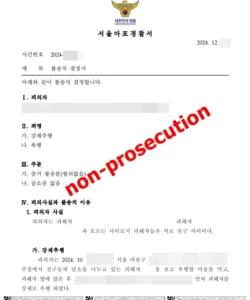According to Korean law, those who possess both a foreign nationality, as well as Korean nationality, are in principle obligated to select one nationality while giving up the other.
Even if you weren’t born in Korea, as a child of a Korean parent you may have obtained Korean nationality by birth without being actually aware of this. In any case, initiating the necessary procedures within the respective deadlines is highly important, since failing to do so can have serious legal implications, especially regarding male dual citizens and their Korean military obligations.
1. Korean Multiple Nationals and Dual Citizenship in Korea
Table of Contents
- 1. Korean Multiple Nationals and Dual Citizenship in Korea
- 2. Legal Options for those with Multiple Nationality
- 3. Korean Nationality Laws: Obligation to Choose a Nationality
- 4. Korean Military Obligations and “Overseas Travel Permit” for Dual Citizens
- 5. Legal Advice for Dual Citizens
- 6. Q&A (Multiple Citizenship in Korea)
Overview: What is a Multiple National?
In Korea, a “multiple national” refers to someone who, because of birth or other reasons stated under the Nationality Act, possesses both the Republic of Korea and a foreign nationality, such as in the cases below.
In the application of Korean laws, they are treated solely as nationals of the Republic of Korea (see Article 11-2(1) of the Nationality Act; Article 16(1) of the Enforcement Decree of the Nationality Act).
– A person who has acquired South Korean nationality and has made a pledge not to exercise foreign nationality
– A South Korean national who reported the intention to retain the nationality of the Republic of Korea to the Minister of Justice within 6 months of acquiring a foreign nationality
– A person who, following Article 2(1) of the supplementary provisions of the Nationality Act (Law No. 10275), pledged to the Minister of Justice not to exercise their foreign nationality and then reacquired South Korean nationality, or reacquired a foreign nationality and then pledged not to exercise that foreign nationality
*Multiple nationals who wish to work in fields where they cannot perform duties while possessing a foreign nationality under relevant laws must renounce their foreign nationality (Article 11-2(2) of the Nationality Act).
Korean Multiple National by Birth
The common case of a Korean dual citizen/multiple national by birth, is that a person was born both with Korean nationality through being a descendent of Korean parents (jus sanguinis) while at the same time acquiring the nationality of the country of his/her place of birth (jus solis).
Example: A person born in a country with the territorial principle of jus solis (USA, Canada, etc.) becomes a multiple national by birth, acquiring both the nationality of the country of birth and the nationality of the Republic of Korea, if the father or mother has Korean nationality at the time of the person’s birth.
– Article 2 of the Nationality Act (Attainment of nationality by birth):
A person whose father or mother is a national of the Republic of Korea at the time of the person’s birth.
In some cases, multiple nationalities are obtained by acquisition, as shown in the table below.
| A person who obtained multiple nationalities by birth/by acquisition | |
| Korean Multiple nationalities obtained by birth | ① A person with one or two parents of Korean nationality, who was born in a country where nationality is granted based on the principle of birth (jus solis) |
| ② A foreigner whose parents are an international couple, and who has acquired the nationality of both Korea and the other parent’s country by the principle of lineage (jus sanguinis) | |
| Korean Multiple nationalities obtained by Acquisition |
① A person who has become naturalized through marriage |
|
② A person who has obtained special naturalization through their father/mother who is a Korean citizen |
|
| ③ A person who has obtained special naturalization by contributing greatly to the Republic of Korea | |
|
④ A person who has obtained special naturalization by contributing to the national interests of the Republic of Korea as an outstanding talent |
|
|
⑤ A naturalized person who cannot give up their foreign nationality due to foreign laws or regulations |
|
|
⑥ A person who recovers their Korean nationality through a special achievement or outstanding talent |
|
|
⑦ A person who was adopted overseas when he/she was a minor under the Civil Act and has since recovered his/her Korean nationality after acquiring a foreign nationality |
|
| ⑧ A person who recovers their Korean nationality, entering Korea after the age of 65 for permanent residence in Korea | |
| ⑨ A person who has acquired foreign nationality through marriage with a foreigner, adoption, recognition, or through their parents’ or spouse’s acquisition of a foreign nationality | |
2. Legal Options for those with Multiple Nationality
In the case of South Korea, multiple nationals have three choices when it comes to their nationality status:
① Living as a Korean Dual Citizen for life (Report of Dual Citizenship):
– Requires submission of a “written pledge not to exercise the foreign nationality”
② Renouncing Korean nationality and maintaining only the foreign nationality (Report of Nationality Renunciation):
– A report of nationality renunciation within Korea is not possible and therefore can only be done by those with an address in a foreign country
③ Renouncing foreign nationality and maintaining only Korean nationality (Report of Nationality Selection)
3. Korean Nationality Laws: Obligation to Choose a Nationality
Acts that contradict a pledge “not to exercise foreign nationality”
A person with multiple nationalities who has previously pledged not to exercise their foreign nationality in the Republic of Korea may be ordered by the Minister of Justice to select one nationality within 6 months if they have committed an act that is significantly contrary to their pledge (Article 14-3, Paragraph 2 of the Nationality Act).
In this case, “acts significantly contrary to the pledge” refers to any of the following actions by those who have pledged not to exercise foreign nationality (Article 18-4(4) of the Enforcement Decree of the Nationality Act):
– Repeatedly entering or leaving the Republic of Korea using a foreign passport
– Registering as a foreigner or reporting one’s residence with the intent to exercise foreign nationality
– Without a valid reason, exercising rights as a foreigner in the Republic of Korea or intending to do so by using a foreign passport, etc. in connection with national or local governments, public institutions, public corporations, or educational institutions
Important Considerations Regarding Korean Dual Citizenship and Military Service
If a person born as a Korean dual citizen wants to live as a multiple citizen of both Korea and a foreign country for the rest of his/her life (multiple nationality declaration), he or she must submit to the Korean government a written pledge “not to exercise their foreign nationality” before they turn 22. In doing so, they pledge “to faithfully fulfill the obligations as a citizen of South Korea (military service, paying taxes, etc.), and not to exercise their foreign nationality, such as registering as a foreigner or using a foreign passport when entering or leaving Korea.
However, male Korean nationals must complete their mandatory military service. Therefore, male dual citizens must already choose their nationality until March 31 of the year when they turn 18 years old, since that is the age from which they become obligated to serve in the military. If a person fails to do so, they will be unable to give up their Korean nationality for the next 20 years.
Permission for Special Renunciation of Korean Nationality
However, in exceptional cases such as the following, it is still possible to renounce your Korean nationality even after March 31 of the year they turn 18, using the “Special Renunciation of Nationality Permit System’.
① If a person was born and raised abroad or immigrated to another country before the age of 6. (This does not include those who were born on so called ‘maternity trips’)
② If a person (even if they were born in Korea) immigrated to another country before the age of 6 and continued to live abroad.
③ If a person, either since birth or after migrating to another country, has continued to live abroad and there is a justifiable reason why they have failed to report a renunciation of nationality
4. Korean Military Obligations and “Overseas Travel Permit” for Dual Citizens
If a man does not want to fulfill his military duties in Korea, it is necessary for him to give up his Korean nationality and retain only the foreign nationality by the end of March of the year he turns 18. Renouncing his Korean nationality will remove his Korean military service obligations. However, since there is a strong negative perception in Korea regarding those who give up their nationality in order to avoid military service, it is important to consider that a later return to Korea may come with disadvantages in their lives.
A male Korean Dual citizen can also postpone his military service until the age of 37, but in order to do so, he needs to meet certain requirements, as described below, and apply for an “overseas travel permit” (period extension) from the diplomatic missions between the age of 24 and the 15th of January of the year he turns 25:
– Someone who has lived abroad for at least three years continuously with their father and/or mother who is/are permanent residents or citizens in a foreign country
– Someone who has lived abroad continuously for 5 years or more before turning 24
– Someone who has lived abroad for more than 10 years
In this regard it is also important to know that male Korean dual citizens, who have not applied and received the overseas travel permit, are in violation of the Military Service Act for which they may be criminally charged. If that person lives abroad, the prosecutor will suspend the prosecution, effectively putting the case on hold, until the male Korean dual citizen enters Korea so that the investigation can be concluded, and the case resolved.
5. Legal Advice for Dual Citizens
Many second-generation Koreans living abroad are unaware of the requirements and procedures regarding renunciation of nationality or even the fact that they were born with Korean-Dual nationality, since the Korean government has not personally notified them. Because of this, there were many cases where second-generation Koreans in the U.S. were hindered from receiving government posts or experienced other obstacles until they turned 38.
These complications occurring with dual/multiple nationality by birth become apparent in the many inquiries we at our Lee&Lee Law Office receive from clients contacting us in regard to Korean nationality law. Many of these complications, such as those regarding military duty regulations of Korean dual citizens, could have been avoided with the help and guidance of a Korean dual nationality expert lawyer.
The Korean Nationality Act and corresponding laws that apply to multiple nationality contain complex regulations, requirements, and deadlines regarding military service, loss/renunciation of citizenship, reporting dual nationality, recovering Korean nationality, and so on, so it is recommended to consult with expert lawyers who are familiar with the governing laws and related procedures. We therefore welcome those who seek advice or assistance with their dual nationality status to reach out to our Korean dual citizenship lawyers here in Seoul.
6. Q&A (Multiple Citizenship in Korea)
Q1. If a male Korean Dual national is unable to renounce his Korean nationality, what consequences does this have on his military service?
A1. It depends. Even if a male Korean-foreign national was unable to renounce his nationality because he did not know when to apply for it, his military service may be postponed (through overseas travel permit) or considered to be have been granted permission to postpone until the age of 37 based on the grounds of overseas migration, if the person continuously lived abroad with his parents. Since the requirements for permission and the requirements for ‘quasi-permission’ are different, it is important to find out which requirements you meet.
Q2. Can I study in Korea if I am a multiple national by birth, or will I be conscripted into the Korean military?
A2. If a person born with multiple nationalities attends a university/graduate school in Korea, he/she will be recognized as a “motherland learner” (student of his/her mother country) and is allowed to stay in the country during that period. If you obtain a “motherland learning permit” from the Korean Military Manpower Administration, you will not be obliged to serve in the military during your learning period.
Q3. Can a person who is a multiple national by birth use a foreign passport when visiting Korea?
A3. No. Those who are multiple nationals by birth must use a Korean passport when entering and leaving Korea (and use their foreign passport when entering/leaving that foreign country). If your birth was not registered in Korea, you must register in the Family Relationship Register through the birth registration to apply for a Korean passport. However, in the case of short-term stays of less than three months, you can enter the country with a foreign passport, but you should be aware that if you travel to Korea frequently, you may be subject to scrutiny by immigration officials.
Q4. What is the application process for Korean dual nationals over the age of 65 who want to recover their Korean citizenship?
A4. Korean Dual Citizenship application process for dual nationals who are 65 years old or more:
① Reporting loss of Korean nationality
② Application for Residence of Korean Residents of Foreign Country
③ Application for permission to recover Korean nationality
④ Receipt of Nationality Recovery Permit
⑤ Written pledge not to exercise foreign nationality
⑥ Reporting Resident Registration
⑦ Return the certificate of residence of Korean foreign nationals in the order of return.
– All applications must be made to the immigration office (resident registration are done at the local ‘Dong’ office) that has jurisdiction over the Korean residence, except the loss of nationality, which can also be reported at diplomatic missions abroad. The Korean immigration office is is in charge of both the reports of loss of nationality as well as applications for permission to recover nationality.
Q5. What do I need to keep in mind when reporting a renunciation of nationality?
A5. A renunciation of nationality can be reported starting from right after you were born, and it is thus not necessary to wait until the 1st of January of the year you turn 18 in order to do so.
Male dual nationals however need to remember that due to the military service law, the deadline for reporting their nationality departure is not based on their birthdays but must be done within March 31st of the year when they turn 18. Female dual nationals may renounce their nationality until they reach the age of 22 (based on their birthdays).
Another important thing to note is the renunciation of Korean nationality cannot be reported while in Korea. Only those with an address in a foreign country can report to the overseas diplomatic mission that has jurisdiction over the address. (You need to have resided in the jurisdiction of the overseas diplomatic mission for at least 90 days prior to applying, or for at least 6 months within a period of one year, prior to the application date.)
Q6. If I renounce my Korean nationality, is it possible to recover it later?
A6. Generally, yes. A person who was a Korean national in the past may reacquire Korean nationality even after losing or renouncing it due to immigration to another country or other reasons. However, they must receive permission from the Minister of Justice for the reinstatement and it may be refused in the following cases:
① The person has inflicted harm on the State or society
② The person’s conduct is disorderly
③ The person has lost or renounced their Korean nationality in order to evade military service
④ The reinstatement of that person’s Korean nationality is deemed inappropriate by the Minister of Justice in regard to national security, sustainment of order or public welfare




